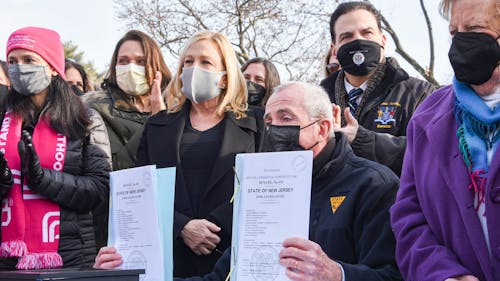Murphy signs 2 new NJ Senate bills expanding access to reproductive care for individuals

Gov. Phil Murphy (D-N.J.) signed New Jersey Senate Bill 49 and Bill S413 on Jan. 13, two new laws that expand individuals’ rights to reproductive care throughout the state, according to a press release.
Bill 49 codifies the freedom to make autonomous reproductive decisions in New Jersey, according to the release. The Bill was first introduced to the State Assembly on Jan. 6 and passed by the Senate on Jan. 10 before it was signed into law.
Bill S413 extends the period of time that contraceptive services must be provided to individuals covered by both private insurances and Medicaid.
Cynthia Daniels, a professor in the Department of Political Science, said Murphy had previously endorsed the law, also known as Freedom of Reproductive Choice Act, and promised it would be passed during his second term.
Daniels said the law preserves individuals’ access to birth control, abortion services and prenatal care. It also provides individuals with funding and access to a full range of reproductive choices by removing economic barriers.
She also said this is the first time the state’s legislature has passed such a comprehensive act. Prior to this law, the state provided public funding only for certain individuals seeking abortions, such as those who receive public assistance or are employed by the state.
The law also allows the New Jersey Department of Banking and Insurance to study the financial limitations that restrict some individuals from obtaining abortions. The Department may require that state-regulated insurance providers include coverage for abortions if they determine that it is necessary.
The law also offers exemptions for employers who have religious beliefs that conflict with the right to abortion. Though, employers who receive this exemption must operate as nonprofit entities and are required to provide notice to employees that they do not receive this specific area of coverage.
The exemption does not apply to religious employers who are in contract with the New Jersey Health Benefits and School Employees’ Health Benefits commissions, which can cover abortion access.
The law expands and protects reproductive freedom in New Jersey as the U.S. Supreme Court considers Dobbs v. Jackson Women's Health, a case that challenges a ban on the provision of abortion services in Mississippi after 15 weeks of pregnancy.
The decision made in this case could affect the decision made in the 1973 landmark case Roe v. Wade, which currently protects the rights to privacy for individuals seeking an abortion during their first trimester of pregnancy.
“The (Supreme Court) could potentially overrule Roe or it might very seriously weaken the Roe standard so that states could pass restrictions on the right to abortion that would make abortion inaccessible to the majority of women,” Daniels said.
She said the timing of the law is critical to the timing of efforts to protect the freedom of choice. She also said it is especially important for individuals who come from low-income backgrounds, as the Supreme Court’s official decision will be released later in the year.
Daniels also said if Roe were to be overturned, many states might ban access to abortion. In New Jersey, the overturning of Roe may result in more individuals traveling to the state to receive abortion care, which may also result in the Act facing challenges in court regarding its constitutionality, she said.
“If Roe were overturned, it might be possible for those opposed to abortion to legally challenge the Reproductive Freedom Act as unconstitutional, yet they are unlikely to succeed given the strength of the support for this Act in the state,” she said. “But we will have to wait and see what kinds of legal challenges might be brought against the Act.”



